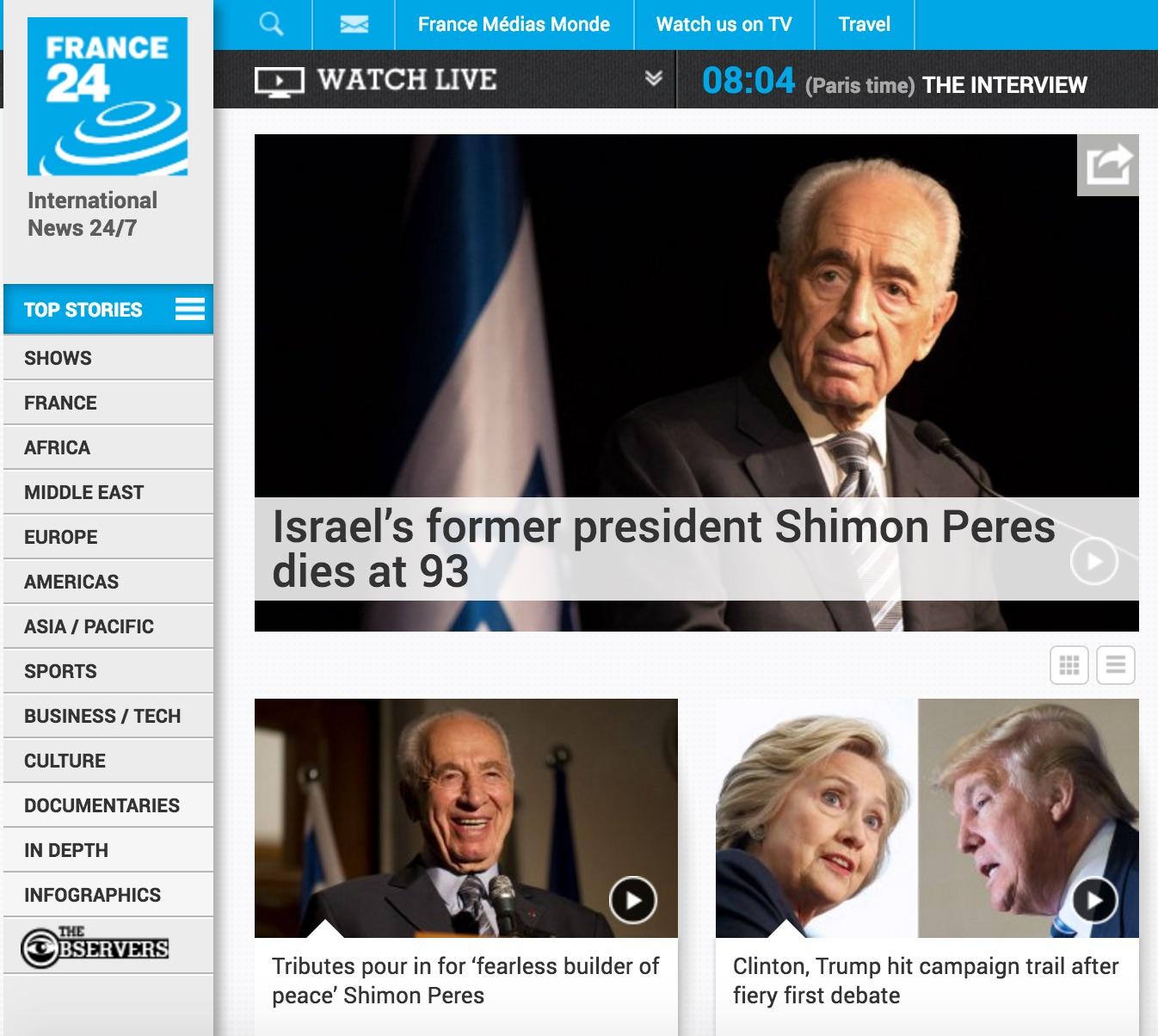Shimon Peres dead: How the Israeli statesman's death was covered around the world
Some report glowing tributes to the former president - but others focus on his troubled past

Your support helps us to tell the story
From reproductive rights to climate change to Big Tech, The Independent is on the ground when the story is developing. Whether it's investigating the financials of Elon Musk's pro-Trump PAC or producing our latest documentary, 'The A Word', which shines a light on the American women fighting for reproductive rights, we know how important it is to parse out the facts from the messaging.
At such a critical moment in US history, we need reporters on the ground. Your donation allows us to keep sending journalists to speak to both sides of the story.
The Independent is trusted by Americans across the entire political spectrum. And unlike many other quality news outlets, we choose not to lock Americans out of our reporting and analysis with paywalls. We believe quality journalism should be available to everyone, paid for by those who can afford it.
Your support makes all the difference.The death of Shimon Peres has made headlines and prompted tributes from all over the world - but it has not been universally positive.
The 93-year-old Israeli statesman died in hospital in the early hours of Wednesday morning, and Barack Obama said "a light has gone out, but the hope he gave us will burn forever".
A host of current and former world leaders, including Pope Francis, the Clinton family, Prince Charles and Mr Obama himself, will attend Peres' state funeral on Friday.
But around the world, and particularly in the Arab world, the response to the Nobel Peace Prize laureate's death has been mixed.
'A pillar of Israel'
In the US, the New York Times hailed Peres as “a pillar of Israel, from its founding to the Oslo Accords”, the peace agreement signed by Israel and the Palestinian authorities which earned Peres his Nobel prize.

In Russia, state media outlet Sputnik International noted that Peres was born in Wiszniew, Poland - now part of Belarus.
“His standing and reputation have earned him international recognition among the nations and leaders of the world,” it said.

In the UK, the BBC led its coverage with reports of Peres’ death, but remained typically neutral on his legacy. It reported tributes, but also noted that Peres was “seen as a hawk in his early years, when he negotiated arms deals for the fledgling nation”, and “a member of the government that approved the building of Jewish settlements on occupied Palestinian territory”.

France24 said Peres had a “distinguished political career spann[ing] almost 60 years”. He was heralded for “combin[ing] an uncompromising stance on Israeli security with a dedication to negotiations with the Palestinians”.

'Peacemaker or war criminal?'
But not all coverage was positive. Al Jazeera, the Qatari broadcaster, asked in its obituary and on its home page whether Peres was “peacemaker or war criminal?”
It reproduced a 2012 interview with Sir David Frost in which Peres said of Palestinians: "They are self-victimising. They victimise themselves. They are a victim of their own mistakes unnecessarily.”
And it noted that Peres’ “most important task” was developing Israel’s nuclear weapons programme in the 1950s and 1960s, something which the country itself has never formally acknowledged.
“Peres, like his mentor, believed an Israeli bomb was the key to guaranteeing Israel's status - both in Washington DC and among the Arab states - as an unassailable Middle East power,” Al Jazeera reported.
It added: “Peres’ later diplomatic skills in negotiating peace agreements with Jordan and the Palestinians were exercised largely out of view, too, though he was keen to take the credit afterwards.”

Dubai-based Gulf News, the biggest English-language newspaper in the UAE, relegated the news of Peres’ death to sixth place on its homepage, some way behind the “real story” of a contestant on Dubai’s version of X Factor.

And the news of Peres death was simply not acknowledged anywhere on the homepage of the leading Palestinian daily Al-Ayyam, based in Ramallah. It reported instead on the plight of fishermen in Gaza, the destruction of homes in east Jerusalem and, in international news, the situation in Aleppo.
Join our commenting forum
Join thought-provoking conversations, follow other Independent readers and see their replies
Comments